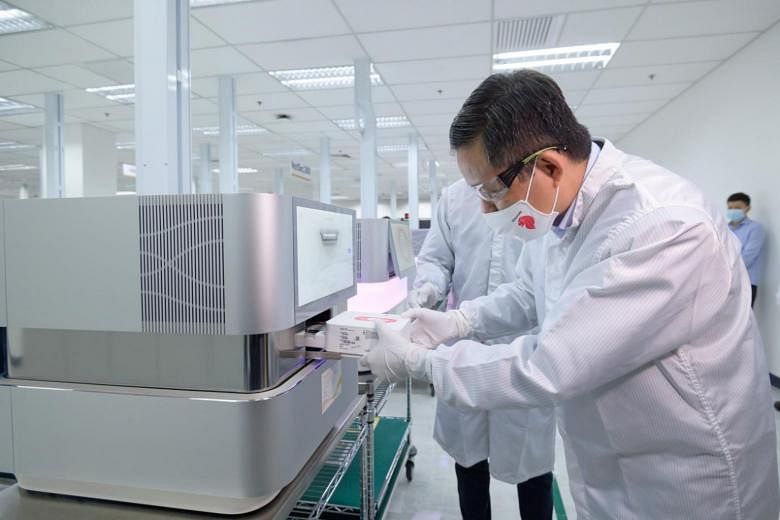SINGAPORE - Singapore is working to grow its strong manufacturing base and seeks to attract the top players to anchor their operations here, said Trade and Industry Minister Chan Chun Sing on Monday (Feb 1).
The manufacturing industry remains a key pillar of Singapore's economy and the Republic wants to build on its existing manufacturing strengths, expanding its capacity and capabilities in emerging areas of growth such as biomedical science, agri-tech, urban mobility and sustainability.
Speaking to the media after a visit to biotech firm Illumina, Mr Chan said that more good job opportunities will be available for Singaporeans as more leading companies in these segments set up and grow here.
Since it set up in Singapore in 2008, the company has not only increased its production capacity here but also helped to grow the ecosystem of supporting SMEs, he added.
Mr Chan said that Illumina represents the type of leading manufacturing firms that Singapore wants to attract, with its 1,300-strong team here producing specialised products such as about 95 per cent of the global demand for microarray bead chips and 85 per cent of global core sequencing consumables, equipment used for disease diagnoses.
"This is what we mean by having the sort of companies in Singapore that will make us harder to be displaced from the global production and supply chain. We are not in the mass market whereby we are competing on price.
"They are competing on the quality of their ideas, the quality of their research, the quality of their production," he said, noting how Illumina plans to continue growing their operations and research teams here.
The minister highlighted that next-generation manufacturing plants are no longer about working in a dirty, dangerous or repetitive environment.
"What we are seeing now are people who are working at the cutting edge of technology in clean rooms, and each and every (one) of the machines is so high-tech that many people will be very impressed with what we are able to do in Singapore."
Mr Chan also outlined on Monday Singapore's three key strategies to position itself as an advanced manufacturing hub - investing in infrastructure, building a strong research ecosystem, and supporting firms in Industry 4.0 transformation projects.
This comes on the back of Singapore's new 10-year plan to grow its manufacturing sector 50 per cent by 2030, which was announced in January.
The sector contributes about 21 per cent of Singapore's total gross domestic product and 12 per cent of its workforce.
In particular, the development of the Jurong Innovation District advanced manufacturing hub will help provide opportunities for collaboration among industry players and strengthen the links between research, economic activity and skills development.
The district, the first phase of which is expected to be completed around 2022, attracted about $420 million of investments in 2020 from the likes of South Korean carmaker Hyundai Motor Group, Japanese automation firm Fanuc and German machines manufacturer DMG Mori.
Mr Chan also noted how Singapore has established Centres of Innovation to develop new Industry 4.0 technologies and solutions across advanced manufacturing and new growth areas such as agri-food.
It is also working with the industry to ensure that Singapore's workforce keeps pace with the industry's transformation, such as through the Advanced Manufacturing Training Academy to identify skills needed and to coordinate training efforts in collaboration with institutes of higher learning and training providers.
Also, Singapore continues to support firms in their transformation efforts, such as through the Smart Industry Readiness Index (Siri), which it is proliferating globally through the WEF-EDB Siri Internationalisation Collaboration.
This standard can be used by companies to assess and motivate the transformation of large enterprises and small and medium-sized enterprises alike, Mr Chan said.
"We have to keep advancing our work, to make sure that we keep pace with the latest demands for the industry in the future."


